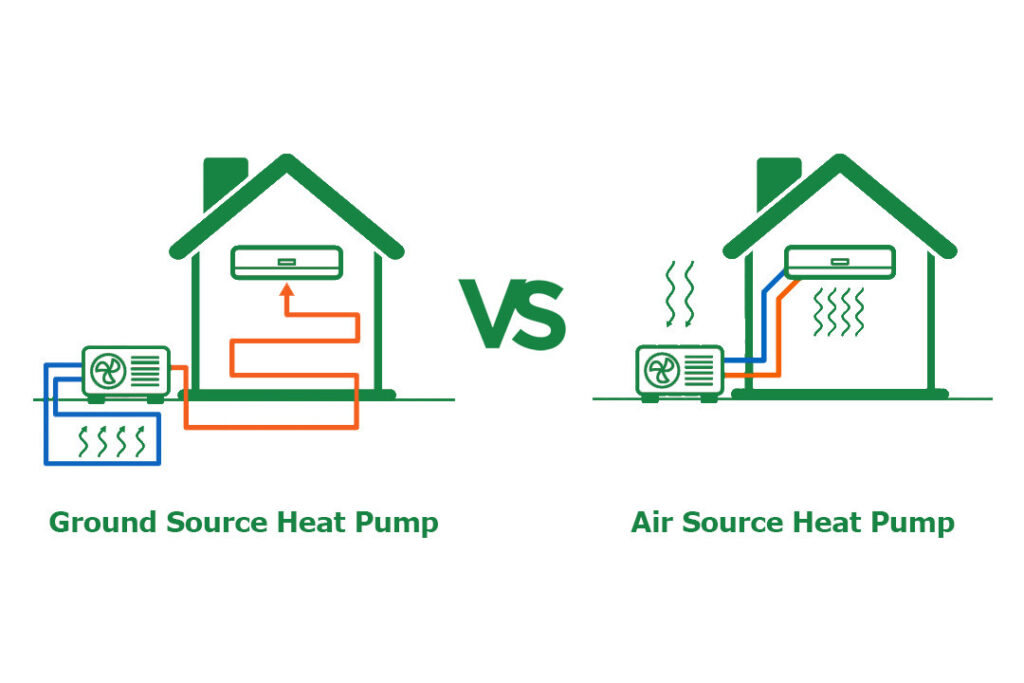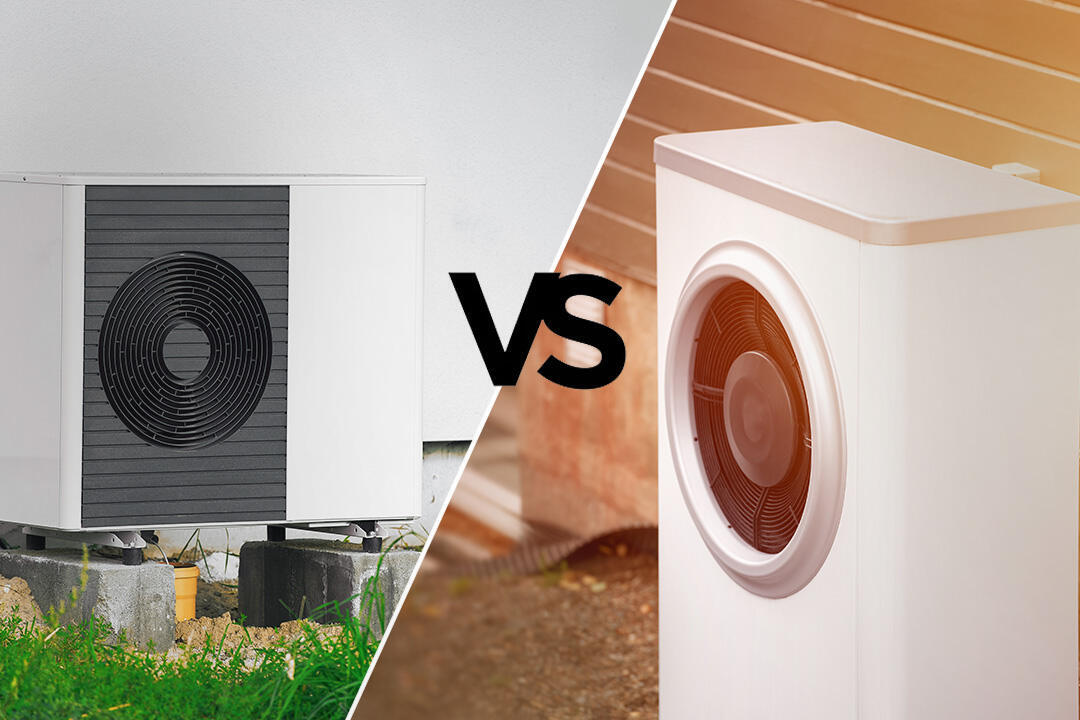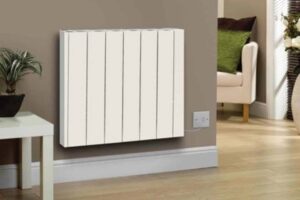Table of Contents
Are you tired of high energy bills but still want to keep your home cosy in winter? Heat pumps might be the solution you’ve been looking for. However, with so many options available, it can take time to decide between air source vs ground source heat pump. In this comprehensive guide, we’ll break down everything you need to know to make an informed decision.
What are Heat Pumps?
Heat pumps are energy-efficient heating and cooling systems that transfer heat between indoor and outdoor environments. They work by extracting heat from a source (such as air or the ground) and transferring it indoors during the winter and vice versa during the summer.
Importance of Energy-efficient Heating Solutions
Rising energy costs and growing environmental concerns have made the search for effective thermal solutions more important than ever. Heat pumps provide an ECO-friendly alternative to traditional heating systems, reducing energy consumption and carbon emissions.
Heat pumps run on electricity, which means that their ability to save the planet depends on how renewable your country’s electricity mix is. 2020 was the first year the UK will generate more electricity from renewable sources (42.9%) than fossil fuels (38.5%), according to official figures, so heat pumps alone seem best for the weather.
What is an Air Source Heat Pump?
Air source heat pumps (ASHPs) are a relatively new form of home heating system. Generating hot water by using natural heat energy in the outside air rather than fossil or non-renewable fuels, ASHPs are being championed for their ECO credentials and lower carbon emissions. Some models of air source heat pumps can operate as both heating and cooling systems, making them well-suited for people living in areas with colder winters and hotter summers.
How Do Air Source Heat Pumps Work?
An air source heat pump that uses air as a source extracts energy from the atmosphere and puts it in with a refrigerant. The hot water is gradually distributed throughout the house through pipes or radiators. However, such devices are not as efficient during mild winters in lower temperatures, so they are best suited where the winters are mild.
What is a Ground Source Heat Pump?
A ground source heat pump is a device that draws heat from the ground and transfers it into your home. Due to radiation from the sun, heat gets stored beneath the surface of the Earth with nothing to cool it down.
Through a network of pipes which are filled with water (or a combination of water and antifreeze), this renewable energy heating system takes this solar energy and circulates it into your home.
Ways to install ground source heat pump
Ground source heat pumps can also be installed in two ways: vertically and horizontally.
Vertical System
Vertical ground source heat pumps take up less space. However, the installation process needs specialist equipment, and you may not receive as much heat.
Horizontal System
A horizontal system, on the other hand, requires a significant space and the installation process requires digging trenches.
How Do Ground Source Heat Pumps Work?
Geothermal heat pumps, also known as ground source heat pumps, use consistent heat in an underground area to heat and cool buildings. A mixture of water and antifreeze is running in the underground tanks, where it absorbs heat from the ground in the summer and warms it in the winter.
Air Source Heat Pumps vs Ground Source Heat Pumps
Energy Efficiency Comparison
There is a slight difference in energy efficiency between geothermal heat pumps and air heat extended systems. For example, soil temperature is constant throughout the year allowing in-depth origin systems to perform well particularly under harsh conditions.
Installation Considerations
Air source heat pumps require less space to install than geothermal heat pumps, making them a practical option for properties where outdoor space is limited but geothermal heat pumps require excavation to install underground pipes, which can be costly and damaged.
Cost Comparison
Air heat pumps cost less to buy. But they use more energy. This costs more, mainly in cold places. Ground source heat pumps cost more upfront. But running costs are lower, as they work better long-term.
| Cost Comparison | Air Source Heat Pump | Ground Source Heat Pump |
|
Price range (excl. installation) |
£8,750-£14,050 | £13,200-£19,000 |
| Boiler Upgrade Scheme | £7,500 |
£7,500 |
Climate Suitability
Air source heat pumps work well in mild weather. But they may not work as well in very cold weather. Ground source heat pumps are good for many climates. They can keep heating and cooling well all year long.
Maintenance Requirements
Both air source and ground source heat pumps need regular upkeep. This helps them work well and last longer. You need to clean filters, check coolant amounts, and search for leaks in underground pipes. But ground source systems usually require less maintenance after they are installed.
 Lifespan and Durability
Lifespan and Durability
Ground source heat pumps last a long time. They can work for up to 25 years if you take good care of them. Air source heat pumps don’t last quite as long. But they can still heat and cool your home for 15-20 years if you maintain them regularly. Heat pumps need some upkeep, but they work reliably for many years.
Heating Performance
Heating works better with ground-source heat pumps. They can keep heating well in very cold weather. Even when it is freezing outside, these pumps can still heat homes comfortably. This gives ground source heat pumps an edge over air source heat pumps, especially in cold climates. So if you live where winters are harsh, ground source pumps may be the better choice.
Noise Levels
Heat pumps that use air can make more noise than those using the ground. This is true when they are working. But newer air pumps use better designs to be quieter. They use parts that reduce unwanted sounds.
Government Incentives
Some countries give grants to eligible people who install heating systems that save energy. These heating systems use air source vs ground source heat pump. The money helps pay for putting in new systems. It makes ECO-friendly heating cheaper for homeowners to afford.
Environmental Impact
Ground and air heat pumps are better for the environment than old heating systems. They use renewable energy sources, which is good. But ground source heat pumps have a lower impact on the environment. This is because ground heat pumps work better than air pumps. Ground heat pumps also use geothermal energy from the earth.
Which Should You Choose?
Air source heat pumps and geothermal heat pumps can operate similarly, but have different designs and requirements.
A couple of things might make your home warmer. You could pay less for heat. You could send out less carbon. These could help you do those things in an efficient way.
If you’re limited by budget or space restrictions, an air source heat pump is more likely to suit you.
An installer who wants to work for you should talk about these topics. They must tell you the details. This helps you find what you need.
Are you considering an air source heat pump?
An air source heat pump may save money long-term, but initial costs can be substantial. You may consider an air source heat pump, but contemplate these factors:
- Space: do you have the space required?
- Budget: remember, there may be funding available to help[Company website of grants].
Conclusion
Heat pumps use air or ground sources for heating and cooling. Air source pumps cost less upfront and are easier to install. Ground source pumps cost more, higher efficiency, saving energy long-term. Climate matters. So does space available. Weigh upfront costs versus future energy savings. The right heat pump for you depends on needs.



